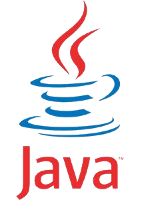What is java?
Java is a versatile, object-oriented, high-level programming language. High-level programming language, as it is characterized by its ease and use of understandable English terms and hides many details for dealing with computer hardware, unlike low-level languages. Object-oriented (OO) programming language, where everything is represented in the form of an object, and every object has a specific type, characteristics and actions that distinguish it from others.General-purpose programming language is a versatile programming language that is used to manufacture software in various fields, including for example Examples are not limited to: desktop applications, web applications, mobile applications, embedded systems applications, and others.
Java is also a software platform that contains a Java Virtual Machine (JVM) that you run Java programs on, regardless of the operating system (OS) or the type and CPU architecture that runs this machine. The virtual Java machine is from an intermediate language called Java bytecode. The Java bytecode code is usually produced by the Java compiler, which translates the Java language into the Java byte code that the virtual machine understands. There are also many programming languages that It can be translated into Java byte code. These languages are called the JVM languages, the most famous of which is Scala.
Because of the nature of the virtual Java machine in that it runs the same Java byte code on any operating environment, the Java language is characterized by the principle of “Write Once, Run Anywhere” (WORA). In other words, write the Java program once. Only, and it will work on all operating systems, unlike other languages such as C \ C ++ where a different program is written for each operating system.
The history of Java
The Java Language Development Project began in 1991 by James Gosling at Sun Microsystems. The name of the language was chosen from the Java coffee that is produced on an island in Indonesia called Java. Therefore, we always notice the association of the Java language with a cup of coffee.

The first version of the Java language was released in 1996. Sun Microsystem has converted Java into an open source language in 2007. At the beginning of 2010, Sun Microsystem was acquired by Oracle, and is still the owner and developer of the Java language and platform.
Java platforms
There are 3 main versions of the Java platform:
- Standard edition (Java SE): This edition contains libraries and frameworks used to build basic functions in any Java program, in addition to building advanced programs such as graphical user interface (GUI) programs, and programs that depend on connecting to the Internet and networks. Internal software, programs that deal with databases, and many others Note that when Java is mentioned in general, it is intended for this version of Java.
- Enterprise edition (Java EE): This edition is based on the Standard Edition. In addition, it contains technologies that help build highly efficient systems that run on servers and are often accessed over the Internet.
- Micro edition (Java ME): This version contains part of the standard edition libraries in addition to special libraries to deal with small devices with limited resources (for example, a small memory, a simple processor, etc.).
There is also a platform for smart energy called Java Cards, and it is considered the smallest of the Java platforms. Examples of smart batteries are: SIM cards, ATM cards, and many more.
Java versions
The Java language and platform have undergone many changes and development since its first release on January 23, 1996. Since the fourth release of the J2SE 1.4 standard platform, Java has been developed through a program called the Java Community Process (JCP) . This program enables organizations and individuals to participate in the development of Java through an organized mechanism. The program includes the use of Java Specification Requests (JSRs), which are documents It explains the technical specifications proposed to add to Java
The following table shows the Java SE versions:


Comments
Post a Comment